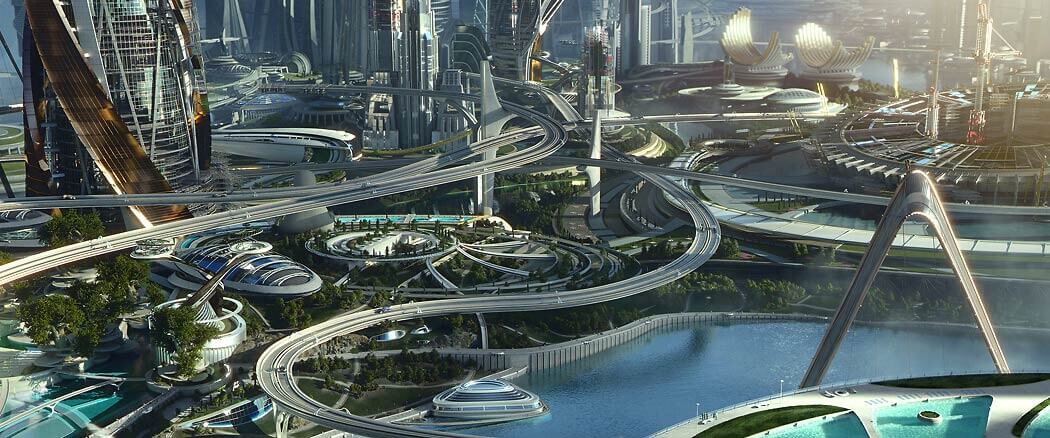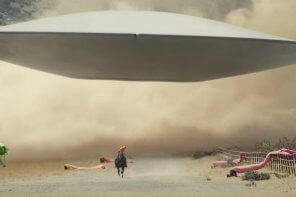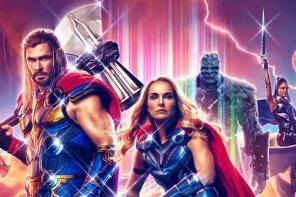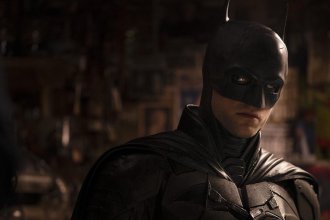Tomorrowland has a simple message: stop being so negative. Yes, there are broader critiques of everything from a disaster-obsessed media to government regulation to dystopic science-fiction but this one message never gets lost. This is due in equal parts to a series of on-the-nose speeches and eye-popping utopic imagery seen during the film’s most breathtaking moments. Clearly the nerdist dream-team of writer Damon Lindelof and animator-turned-director Brad Bird believed the old axiom “Show, Don’t Tell” wasn’t good enough for their extra-dimensional sermon. So yes, it’s preachy… but it’s also really watchable with stand-out performances from leads Britt Robertson and Raffey Cassidy plus Clooney (who my 12-year old referred to as “that old man”) fights House.
The Dreamers of Dreams
George Clooney is Frank, an embittered genius inventor who had the keys to Paradise but lost them. He lives as a recluse in today-land (2015? the near-near-future?) monitoring the world’s disasters from his robot-proof farmhouse. We see him (as a child) in extended flashback/Disney commercial accepting an invitation to utopic Tomorrowland where he will be free to dream surrounded by the best and brightest. The key is a “T”-shaped pin which grants the wearer access through an impossibly complex series of transport devices. He is eventually cast out into exile, never to return.
Our heroine, plucky modern-day teen genius Casey (Britt Robertson), also receives a T-pin. Touching the pin gives her direct access to Tomorrowland in the movie’s biggest CGI setpiece. Bird’s best-case-scenario version of the future is a wunderkammer of high-tech geegaws reminiscient of those 1950s predictions of the year 2000: all brightness and vitality and humans taking flight across a gleaming, towering cityscape (except with 100% more people of color). Casey’s pin eventually runs out of juice forcing her to locate Frank so she can get back to the future.
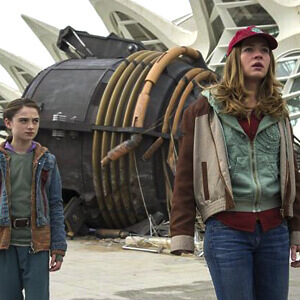 Uniting the two leads is British tween Raffey Cassidy. She is the mysterious Athena, appearing to both Young Frank (1964) and Casey (2015) with a vague mission around which the entire plot turns. Watching Cassidy guide the other two through the world makes the whole movie worth watching: she has great chemistry with both leads and is at turns funny and deadly (spoiler: fight scenes) with an undercurrent of pathos. Rounding out the main characters is Hugh Laurie as David Nix, an inexplicably fascist government figurehead (you can tell he’s evil because he’s a white, British male!).
Uniting the two leads is British tween Raffey Cassidy. She is the mysterious Athena, appearing to both Young Frank (1964) and Casey (2015) with a vague mission around which the entire plot turns. Watching Cassidy guide the other two through the world makes the whole movie worth watching: she has great chemistry with both leads and is at turns funny and deadly (spoiler: fight scenes) with an undercurrent of pathos. Rounding out the main characters is Hugh Laurie as David Nix, an inexplicably fascist government figurehead (you can tell he’s evil because he’s a white, British male!).
[inlinetweet prefix=”” tweeter=”@cinemafaith” suffix=””]Tomorrowland considers who is worthy to inhabit Eden & the many ways we disqualify ourselves[/inlinetweet] (greed, stupidity, destructiveness, defeatism, fatalism). In the end only those that are unfettered in their dreaming can enter the glowing gates of Tomorrowland. Will Old Frank and Casey be able to save the world?
Two Eschatologies Diverged
Interestingly, the message of two competing visions of the future is also at the center of some of Christianity’s most contentious debates. One vision anticipates the decline of civilization culminating in the removal of true believers to heaven and the destruction of everyone and everything else. Popularly portrayed in the Left Behind franchise, this version of events sees a downward trajectory to history and embraces the unofficial motto “It has to get worse before it gets better.” The mission of the Church here is to rescue as many people as possible before the ship sinks.
A second vision embraces the existence and in-breaking of the Kingdom of God right now with most of the biblical pictures of destruction having already taken place. The culmination of history in this version was the resurrection of Christ who now reigns in victory over the universe. The mission of the Church in this case is as a vessel of God’s justice, peace and new creation in & to the world. The ship isn’t sinking, it’s being methodically upgraded by the captain and crew, and the passengers are being invited to help.
The dilemmas Bird’s secular apocalypse and Kirk Cameron’s religious one poses are the same: Which vision of the future will you believe? And more importantly: How will you respond to that belief? What we do in this life matters, and embracing eschatalogical defeatism is a rejection of the good world God created. If we lose site of the end-goal (the peace and flourishing of the cosmos) and embrace the “burn-it-down” approach we miss out on aligning our God-given visionary gifts with God’s eternal purposes. And we dismiss the glimpses of Tomorrowland we can experience today.

